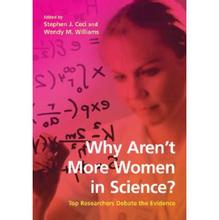Although this is not a comparative essay, I think that this passage “Is Math A Gift? Beliefs That Put Female at risk” raises lots of different opinions about fewer women in top science compared with passage one and two. Carol thinks that  men and women have no difference in math ability, but women who believe that math is a gift are more vulnerable when facing challenges.
men and women have no difference in math ability, but women who believe that math is a gift are more vulnerable when facing challenges.
Compared with gender schema and cognitive difference, the vulnerability difference between men and women is a point that not easy to think about, but the statistics and experiments made by the author prove it. And who makes this vulnerability? It’s the belief that math is a gift. Girls who believe math is a gift will be suspicious about their abilities when facing difficulties in math, while girls who believe that math can be learned through effort will not be so vulnerable. In fact, when I first see the question “Is math a gift?”, I just think this is definitely an excuse. It is an excuse for your less effort. I know that many girls have these thoughts that math is a subject for who has the math talent. This kind of belief will make you to pay less effort to that because you think you can’t do it well due to the less talent. This definitely will lead to bad expressions in math. In fact, as an advocate for incremental theory, I totally believe that math can be improved by effort. From Chapter 1 we can see that there is no talent in human beings that can be assessed. And even if there has this kind of talent difference between men and women, it can be improved by effort. In fact, the ratio difference at top is notably decreasing, and at the medium grades, women do better than men. So if the statement that math is a gift is true, this talent loves women.
But here comes a question: why do men get less influence from this belief compared with women? From the statistics we can see that men are less influenced by the belief and are less vulnerable. But the author points out that this vulnerability is caused by the belief that math is a gift. And there must be some boys who also think that math is a gift. So why don’t the boys get the influenc e and become vulnerable? From the argument in the passage, we cannot see that. So this is a very important shortage in the passage that we should to find out. And what I think is that it’s because gender schema. The gender schema told girls that you are not good at math. So those who believe math is a gift will be influenced more by the stereotype and thus influence the scores. However, for boys, the gender schema told them that they must be good at math. So the gender schema forces them to pay more effort and can do well. This is only an assumption, and at this time, I don’t have many statistics to support it. So what I do is just to let my readers to think about this question.
e and become vulnerable? From the argument in the passage, we cannot see that. So this is a very important shortage in the passage that we should to find out. And what I think is that it’s because gender schema. The gender schema told girls that you are not good at math. So those who believe math is a gift will be influenced more by the stereotype and thus influence the scores. However, for boys, the gender schema told them that they must be good at math. So the gender schema forces them to pay more effort and can do well. This is only an assumption, and at this time, I don’t have many statistics to support it. So what I do is just to let my readers to think about this question.
The professor also talks about the ways to reduce this vulnerability, and she thinks that what we should do is to change the girls’ opinions that math is a gift. She denies the commonsense way—praising girls when they do good jobs. She thinks that this will convey them the opinion that math is a gift, and when they find they are not the gifted ones, they will lose confidence. This way sometimes will lead to the situation that the author depicts, but this way is not as bad as that. From my personal view, I think praising is a very good way but you need to care about the words in praising. If you always use the words like “you are so talented and gifted”when you are praising someone, this will lead to the bad situation. But if you praise someone like “you did a very good job because of your hard working”, the situation may be a good one. And these words can help people to be more hard-working and believe that math is something that we can get through efforts and thus change the suspicious girls’ opinions. Also, the professor uses the experiments to points out that we can address the students’ belief about nature of ability by teaching them and making lectures about the topics and then improve their performance on math. However, what I think is that the belief which is caused by gender schema cannot be moved so easily. This kind of gender schema has influenced us unconsciously for over than 15 years, so how could it change in only eight-session intervention? So I think that the “showed” increase in grades for girls after the intervention is not a representative data which leads to the conclusion.
What’s more, I really doubt the process of the experiments mentioned in this passage. First, we can see that the experiment for proving that changing the students views can lead to a great increase in grades has more than one variable. The one is learning about the expandable nature of intellectual skills, and the other one is learning high-quality instruction in useful skills. So with two variables, we cannot get such a causal conclusion. Second, for another experiment mentioned in the passage which is teaching adolescents the same math lesson in two different ways, one group is taught that math is a gift, which reinforces their opinions from the gender schema. This is definitely not fair for the students in this group.
So after reading the passage, I think that the belief that math is gifted is definitely a reason for fewer women in top science, but the passage has not proved it perfectly.
Reference: Is Math a Gift? Beliefs That Put Females At Risk ———Carol S. Dweck